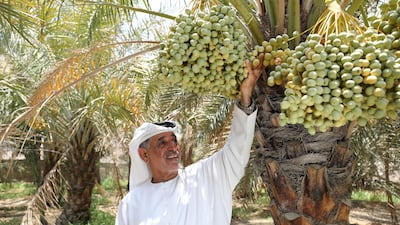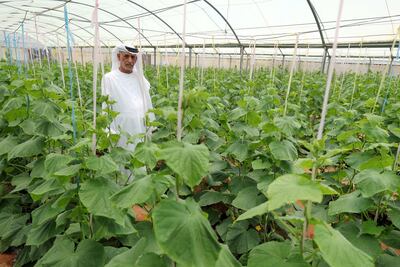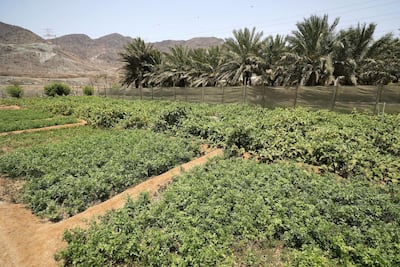Farmers in Fujairah have stopped growing fruit and vegetables because of the costly resources needed to cultivate them and tough competition from importers.
Some say they have gone back to growing only dates as growing vegetables has become so expensive.
"Many vegetables need desalinated water to grow, not like the date palms, and to operate one I need to get a better electrical connection with higher voltage and Dh50,000 to Dh80,000 to buy the system," said Ali Al Kindi, an Emirati who owns three farms in the east coast emirate.
“I used to grow tomatoes, cucumber, onions, lemon and other vegetables but I can’t afford it anymore. I pay around Dh1,500 every other day to water the date palms and the grass, which used to feed animals, but I would pay triple the price to grow vegetables,” he said.
High costs have driven Mr Al Kindi, 65, to close two of his farms.
________________
Read more:
Special report: Al Ain farm tackles food and water security by pairing fish with watermelons
FNC discusses increased protection for UAE farmers from cheaper imports
Local organic produce is becoming more affordable and available, thanks to government scheme
________________
“I can’t afford to open the three farms; it needs more workers and more money. I cannot rely on profits from the farm as it only covers 20 per cent of the expenses and I have to pay the rest from my own pocket but it’s my only profession and our ancestors’ legacy and it should stay alive for the future generations,” he said.
Another farmer said maintaining his farm was no longer feasible as local produce sold for so little when a kilogram of cucumber fetches less than Dh1 in Fujairah.
“The profit of growing vegetables is very low, if there is any, as the market offers very low prices. For example, they buy the cucumber basket that weighs 8 to 10 kilograms for only Dh7 to Dh10 depending on the season,” said Rashid Obaid, who owns a farm near Al Bithnah.
He said buyers at the fruit and vegetable market pay only Dh10 for 20kg of eggplants and Dh20 for 10kg of zucchini.
“I have five workers and I pay them around Dh6,000 each month. I also pay more than Dh500 for electricity, depending on the season, and around Dh25,000 or more to buy seeds, fertiliser and pesticides,” he said.
"I use the hydroponics system, but it doesn't work on all the seeds and crops and I can't get a water desalination machine as it will not work with the poor electrical connection that I have at the farm," said Mr Obaid.
According to Fujairah Statistics Centre's yearbook, fruit production in Fujairah increased by 16 per cent in 2017 to 42,061 tonnes, compared to 36,234 tonnes in 2016 while vegetable production increased by 5.4 per cent from 11,204 tonnes in 2016 to 11,805 tonnes in 2017.
About 83 per cent of the total fruit production comes from dates, followed by mangos, lotus jujube and lime.
“I grow palm dates, tomatoes, cucumber, eggplants and sometimes zucchini and okra. If I have a good water resource I would definitely try planting other kinds but the market is relying on the imported products and the water resources are not available,” said Mr Obaid.
A farm owner in Masafi also said that he struggles to turn a profit selling fruits and vegetables and argued that it was not financially feasible to continue to do so.
“The market doesn’t encourage us to plant fruit and vegetables. They buy it with very low prices and we don’t get any profit,” said Obaid Al Mismari, 70
“I used to grow vegetables before but not anymore. It costs a lot and requires hard work. Now I only have palm dates and Alfalfa grass for animals,” he said.
Tomatoes are the most popularly grown in Fujairah, comprising 30 per cent of the emirate’s total produce, followed by leafy greens, cucumbers and other vegetables.
In January 2017, farmers across the UAE said they had been forced to stop planting crops and in some cases abandon their plots of land altogether because of a lack of fresh water.
A few months later, FNC members had raised complaints from local farmers, who said their produce was being outsold in supermarkets by imported produce at lower prices.
The Ministry of Climate Change and Environment responded by launching a programme to make local organic produce more readily available in supermarkets around the country and more affordable in comparison with its more expensive, imported counterpart.



